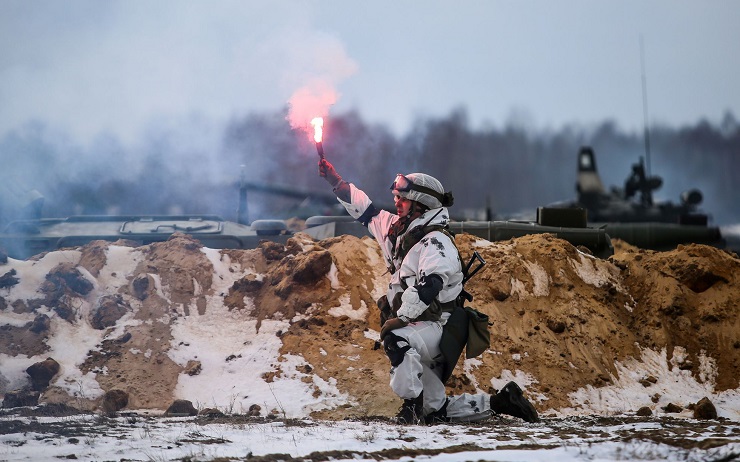“Do the Russians want war?” This is the type of headlines in Middle Eastern media reports on the recent Western-led information campaign dealing with the alleged military threat posed by Russia. The mosaic of approaches and opinions is wide-ranging. Some commentators take a light-hearted view of the events and adopt theses of Western propagandists, muddled with false assertions and conclusions.
Others, and their number is increasing, are more skeptical about the accusation campaign launched against Moscow and endeavor to explain the background to what is happening on the basis of objective factors.
A number of authors have been drawing attention in particular to the deep and close ethnic, economic and cultural ties linking Russia and Ukraine and their peoples for centuries. They now determine the mutual interest and reciprocal attraction of both sides, according to the Emirati newspaper Al Khaleej. It laments that the mutual enmity between the West and Russia is only escalating tensions and worsening the overall atmosphere of international relations. This could give new impetus to the Cold War and deepen the polarization of the world. What is needed are sensible and wise approaches to creatively resolve the crisis that would preserve peace, allay Russia’s apprehensions and give it the guarantees it needs to ensure its national security and the aspirations of peoples for independence.
A number of observers tend to see Washington as being behind the stirring up of the crisis and tensions between Russia and Ukraine. The Lebanese author recalls that in the past, the US prepared and declared wars under the camouflage of all sorts of attractive moral pretexts to conceal their aggressive nature. For example, the reason for the war in Afghanistan was to “protect peace” from the dangers of terrorist organizations. Intervention in Iraq was justified by the argument that it was necessary to “save the world” from weapons of mass destruction.
As for Russia, Washington’s plans to contain and embrace it also need some kind of attractive wrapper. The slogan of “helping the democratic US administration to Ukraine” in the face of a Russian “invasion”, which has become a leitmotif in the Western media, is tossed in here. But the Arabs, according to the author, are well aware that NATO’s expansion eastward began long ago, when there was no talk of a Russian “takeover of Ukraine”.
A number of Arab commentators dismiss Western media manipulation of the eastern neighbor’s malign intentions towards Ukraine.
Iraqi political scientist, Dr. S.A. Kader Mustafa, who was educated in Ukraine in the 1980s, responds to them in his article. Many friends and relatives he speaks to on the phone, whether in Odessa, Kyiv, Kharkiv or Kryvyi Rih, confirm: Ukrainian citizens understand that the US, NATO are behind the escalation of this information surge and are creating problems between Moscow and Kyiv. Life goes on as normal, his interlocutors admit.
The Middle Eastern media draws attention to Europe’s position in the current confrontational situation with Russia. Al Jazeera points out that after two decades in Afghanistan, which ended in failure, the US is reviving the Western alliance, returning it to its traditional theatre of operations under the pretext of demanding a new Cold War.
Some 20 years ago, Germany and France showed their sufficient courage to oppose the US takeover and occupation of Iraq in 2003, which turned out to be disastrous not only for Iraq and the entire Near and Middle East, but also for the US and Europe itself. Now is the time to take a similar attitude and show the world and the US the way towards a diplomatic solution to this crisis. Indeed, the European powers could suspend escalation for the worse if they veto NATO’s expansion eastward and that would be a very good thing, says the channel.
According to other authors, dragging European countries into all sorts of sanctions will hurt Europeans themselves. They have extensive economic ties with Moscow, particularly in energy imports.
Restrictions of all kinds, in particular the promoted withdrawal of the Russian Federation from the Swift system, will hurt primarily the interests of Europe, especially against the background of the ongoing pandemic. This includes higher prices for gas and heating, other goods, higher inflation, etc.
The West probably does not realize that if it continues to drive Moscow into a corner, it will push Russia towards greater cooperation with the PRC, India and the South. This, according to the Moroccan expert, could end up leading to new military alliances with the PRC, and possibly with India, in the future.
Academician Yevgeny Primakov called this “the strategic triangle” a quarter of a century ago.
Arab media emphasize that the joint statement the Russian Federation and the PRC issued on February 4, 2022 means that the world is on the way to large-scale change. This is highlighted in particular by the Lebanese newspaper.
Yuri Zinin, a senior researcher at the Center for Middle Eastern Studies, Institute of International Studies of the Moscow State Institute for International Relations, exclusively for the online magazine “New Eastern Outlook”.

